|
Can anyone be surprised that a movie about gullible, venal, self-serving, credulous and sensation-seeking characters, wasn't enthusiastically embraced by the great unwashed? Of all of Billy Wilder's remarkable oeuvre, Ace in the Hole stands the tallest to me. It is a giddy combination of the worst excesses of human greed married to a cynicism that even pulls 21st century audiences up short. It illuminates a slice of humanity that is barely worth anyone's sympathies but by the end of the movie, through the skill of performance, a script blessed by dark angels, the tiniest redemptive ray of light and direction that mixes all aspects into one heady dose of black magic, Ace in the Hole becomes a cinematic triumph. It's almost a cliché in movie fortunes that the great and good are rarely appreciated at the time of their production and many do not distinguish themselves financially. Ace was regarded as Wilder's first real flop, which must have put his fourteen-year partnership with writer Charles Brackett into sharp relief (this being the first picture he made after their acrimonious break up). Regardless of Brackett's non-involvement, the script cannot possibly be held up to blame for the movie's stalling at the box office. What do we know now that we didn't know in 1951? Oh, I don't know, the profound depths of ignominy the human animal will stoop to in order to get ahead? Does the murdered girl Milly Dowler's hacked phone and ghastly, ethic-free News of the World journalists ring any bells? I hope they all fry.
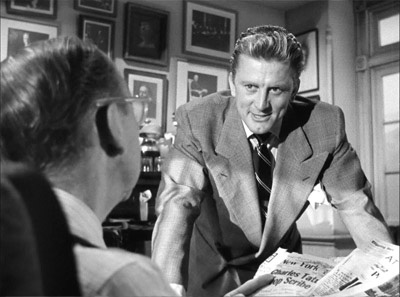
It's difficult to appreciate the raw power of one of America's best leading men in the 1940s and 50s. Known more today as Catherine Zeta-Jones' father-in-law, Kirk Douglas (born Issur Danielovitch Demsky) was a physical powerhouse in his prime. For my money, he never turned in a dishonest performance because it seemed he poured himself into his roles with complete abandon. He makes the word commitment actually mean something rather wonderful. He has the jutting, dimpled chin of potential but promised pugnacity, the broad shouldered swagger of a bear with a gym card and an attitude that makes fools suffer. He is as commanding a screen presence as there ever was and despite Hollywood's propensity for giving him 'son-of-a-bitch' roles, he made each and every one sing. OK, maybe I've not seen every one of Douglas' performances but the man exudes charisma the way Tony Blair radiates hypocrisy. He's bold, he's right there in the moment and in Douglas's case, these are great gifts for an actor. Under Stanley Kubrick's direction as Spartacus, he made a startling impression. I can still recall with surprising clarity the scene where he's stripped to a loincloth and his body parts painted to illustrate the best killing sites for swords and pikes. How a man keeps his dignity in such situations is probably why he was cast. Known to Kubrick as Colonel Dax in his earlier film, Paths of Glory, Douglas was always the man in my youth who fought a giant squid with his bare hands in 20,000 Leagues Under The Sea. He's still with us but at 98 years old, he may be turning down the more physically demanding roles. Just reading his quotes on his IMdb page as well as all the health issues he's had to deal with makes me admire the guy even more. He was instrumental in bringing the dangerous but theatrical farce that was the Hollywood blacklist to a close by acknowledging Dalton Trumbo's work on Spartacus. But it is his performance as Chuck Tatum, the star reporter down on his luck, the writer desperate for fame with an ego bigger than other men's lives, which is the single performance of his career that shows the world what this man is capable of.
Ace in the Hole tells the story of a man desperate for the world to recognise his talent and so land another prize job for one of the top newspapers. After a career that took in slander, adultery and alcoholism, he finds himself at the bottom of the greasy pole in the south western states having tasted a morsel of stardom and fame. Now, he'll do anything to get it back. Working for the Albuquerque Sun-Bulletin, he lasts a year on the wagon quietly filing stories for his modest editor, Jacob Q. Boot (Porter Hall), a man who takes no chances wearing both belt and braces and just before arriving at a rattlesnake hunt, Tatum hears about the hapless Leo Minosa who's trapped underground after trying to liberate Indian artefacts. Taking control of the situation, Tatum investigates further. His commanding behaviour in this scene reminded me of Eddie Murphy in Beverly Hills Cop and just how far a swaggering confidence can take you. But Tatum is canny and takes just enough risks to begin a relationship with the stricken man. Poor Leo is not in a position to be choosy and he puts his faith in the one soul who (whoops, spoilers)...
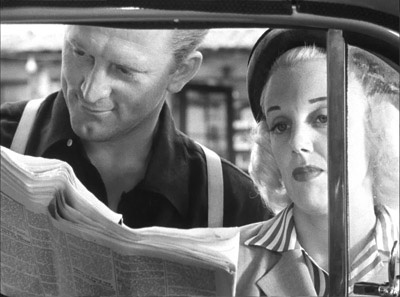
Billy Wilder doesn't take sides per se but as a director, a point of view is essential. He offers up Tatum as a man of his and our time, a scheming, immoral bastard who's stood on the summit, fell hard and is now working his way back up exploiting others' misfortunes. You never get a sense that Wilder is wholly sympathetic with his anti-hero (perhaps in the first twenty minutes, he may allow us to feel a smidgeon of consideration for the poor schmuck – at least he's honest to his new boss) but Wilder never glorifies Tatum nor does he condemn him. His behaviour and some incidents in the film stretch credibility but as long as it's not broken, you ride with the rhythms of the piece. One curio of direction that a few directors indulge in is the wipe started by a body moving directly at the camera lens and as the screen goes black, we reverse the action after a considerable time has passed. I always used to find this little trick infuriating because of the attention it drew to the camera but I love this movie so much that I wholeheartedly forgive it this one annoying piece of craft. Once the attention of the few rubberneckers turns into the carnival of the crowds, the film pads barefoot and bold into allegorical territory. Tatum has all avenues of news sewn up (an unrealistic occurrence that a few found fault with) and rules the scene with an iron grip. His mastery of the crisis extends to a short but savage relationship with the trapped man's wife, Lorraine (played with a studied insouciance by Jan Sterling). She has the best line, describing Tatum after realising how low he'd go to stretch the story out; "I met a lot of hard boiled eggs in my time but you? You're twenty minutes..." She's anxious to leave her husband Leo but under the media spotlight, Tatum needs her to play the role of worried wife, another angle on a story that is spiralling out of any one person's control. It's in these scenes that Wilder deepens the motivations of the characters and it's true to say – if a little grim – that no one comes out of the picture looking good with the possible exception of Porter Hall as the local newspaper's editor.
We're in New Mexico and there's a faint but unmistakable whiff of ingrained racism when it comes to the Native American characters. While those playing these roles weather the subtle abuse, it's a testament to how attitudes have changed that it becomes noticeable at all. Tatum's first meeting at the newspaper's offices begins with a racist "How!" and he throws in a "Geronimo," a little later on. You never get the sense that he actually means anything nasty by behaving this way but like all racist sentiment, it's its acceptability that is its most pernicious aspect. It's fair to say that Chuck Tatum is an equal opportunities misanthrope and has the same contempt for people usually witnessed and seldom well concealed in politicians. The crack in the moral sidewalk, the moment when the brakes come off is one beautifully judged scene when Boot, his small town editor turns up at the scene and prises a little bit of caritas out of the old cynic. Of all things, it's Tatum's renewed alcoholic intake that keeps caring at bay. From this moment on, you're seeing a man slide and no guesses needed that his angle of descent will get steeper and steeper.
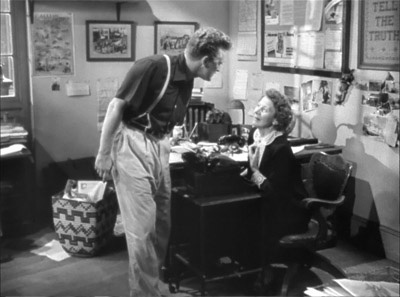
The film is garnished with some wonderful touches, tiny details that add to the richness of this bona fide classic. After a year at the paper, Tatum is getting restless and pours out an impassioned speech about the benefits of the life he was forced to leave behind. At one moment, he says "What do you do for noise around here? No beautiful roar from eight million ants, fighting, cursing, loving..." At that last word he thrusts himself towards the only female in the office, an older lady. In any other director's hands, her reaction would be to move away, to flinch from such a powerhouse in mid flow. Instead this glorious character is directed to lean in towards Tatum with an enchanted look on her face. It's a small moment but it serves to show that this man, despite his faults and ambition has an animal charisma. He is socially seductive and actually makes people feel better throughout the movie for all the wrong reasons. When he is faced with authority at the site of the trapped man, the smell of circulatory blood (as in newspaper circulation) moves Tatum to treat the cop at the scene like a child. "Gimme your flashlight," he says as he extracts it from the cop's belt. The cop responds with a "Why you..." and is smacked in the chest with the same flashlight. "Shut up," says Tatum with a gesture that today would land him in prison for assault. Douglas backs this aggression up with an almost perpetual threat in his demeanour. As the carnival arrives, trucks pull in with writing on their side, which is open to a second reading, a reading that could easily be applied to this movie. The words are "The Great S&M Amusement Corp." Apt, huh? Other reviews point this out as Wilder at his more acerbic. Can't argue with that. There is also the subtle (perhaps not that subtle) upping the cynicism by showing various escalations of the price of entry to the carnival that is slowly erected at the site of the disaster unfolding.
The scope of the production is impressive. Once the carnival arrives, people pour in from trains and buses and you know from simple common sense that all this was done for real. Yes, there are a few pick up mid shots that were shot on the back lot but the wide shots that establish the crowds are the real thing and give the movie a stamp of authenticity. The contempt for the human animal at this point in the narrative is now unfettered. The venal sheriff reaches out to his radio and television audience urging them not to vote for him because of his actions at the rescue site. We're now firmly splashing about in satiric waters. The country and western band singing about Leo firmly underlines this. This isn't to say it punctures a hole in the drama – not at all. It's the feathering on the headdress. Even the music sounds cynical. Hugo Friedhofer, Oscar winner for his extraordinary work on The Best Years of our Lives turns in a masterful score which is both memorable after the fact and coldly calculating. It fits the movie snugly, simultaneously knowing and louche.
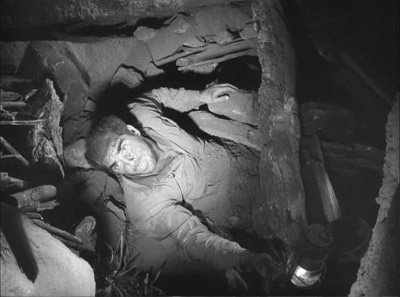
Ace in the Hole is Billy Wilder doing what Billy Wilder does best – showing people for what they are not what they pretend to be and making it gloriously entertaining. He would have hated that remark. Pretention was not one of Wilder's attributes. But whatever reading you can make on a film of this depth and ambition, I don't think there's any doubt about its stature in the Hollywood firmament despite its poor box office. This one is a true classic.
I've not seen many sixty-three year olds scrub up this well. To see this level of detail on an old friend is always a thrill. Presented in a 1.35:1 aspect ratio, there's some minor damage, dust spots and the like and a few hairs that may have been unavoidably exposed on the original negative (all copies I have on various media all share the same curly hair that pops up about 44 minutes and 22 seconds in and lasts the whole shot) but apart from that, contrast is relatively solid. Some lighter scenes could have had the black dial raised another notch but it fair pops off the screen the way well preserved black and white photography should. There looks like there is some over exposure in a few shots where fabric detail gets blasted by scorching sunlight and the grain is evident but not that you'd care. Some of the process photography backgrounds, while done very well and almost convincingly, betray a half to a full stop overexposure (a side effect of photographing projected film I'm guessing). The stillness of the foreground object like a car often is the giveaway in black and white rear projection.
Sound wise, the mono LPCM 2.0 has no significant flaws. Every word of the dialogue is clear, emanates from dead centre and the stridency of the music is evened out in a very pleasing sound mix. There are optional English SDH subtitles.
Neil Sinyard on Ace in the Hole (HD – 33' 51")
Interspersed with posters and stills from Wilder's archives is a single mid shot of Neil Sinyard (a professor in film studies at the university of Hull wearing a classic Pringle jersey) delivering his insights about the movie and they are all gold. It's a single locked off talking head shot with a few high spots in the frame including the top of Sinyard's hairless crown. On the shelf behind him is half a Dalek and a whole host of DVDs, with some 'cool' titles discernible. He draws some interesting parallels with Wilder's own filmmaking and the trials of his anti-hero on screen. He defends Jan Sterling's character and performance that suffered from the odd syndrome where the character's flaws distance the actress from public and critical approval. Each of his arguments is presented with a twinkle in his eye. The man still has a great passion for this movie. If it wasn't for the Pringle jumper, I'd say he reminded me of someone very familiar. This is a solid accompaniment to the essay on offer in the booklet (see later).
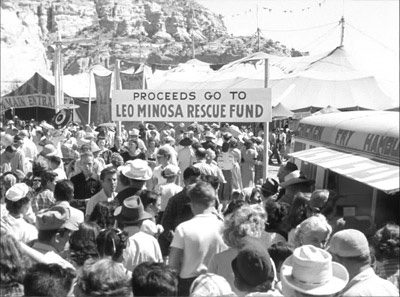
Portrait of a 60% Perfect Man (HD – 58' 30")
Made by Annie Tresgot and Michel Ciment, this is what appears to be a 16mm originated movie presented in 1080 HD and is a loving and overtly respectful interview with Wilder in the autumn of his career shot in 1982. It's curious there's a 1998 copyright notice at the end. What? How does that work? Has it been repackaged? There are contributions from a few of those he worked with including both Jack Lemmon and Walter Matthau. Wilder is a very attractive interview subject who has lived an extraordinary life. His stories sparkle with a sly wit. He used to be a journalist and was once thrown out of Sigmund Freud's house (Freud despised reporters). Some of the interview shot at Wilder's office as he paces about whites out alarmingly as the bright Californian sunlight streams in through the windows. I love the idea of his learning his craft by watching Howard Hawks direct Ball of Fire, a wonderful Gary Cooper comedy. Wilder gets to show off his art collection (eclectic, which is no surprise), fly a kite in Malibu and explain how certain iconic classic Hollywood imagery came about (Monroe's dress blowing upwards was eventually shot on a soundstage after heckles from the public on a real street). I love the idea of Marlene Dietrich being, in reality, a German hausfrau. "Both of us have nice accents!" says the German to the Frenchman Ciment after a particular pronunciation of the word 'echo'. Comparing Wilder to Sherlock Holmes is a delightful conceit. I'll leave the last word on this Extra as it appears on screen from Wilder himself walking away up an L.A. beach with Ciment, the interviewer...
"You French sure know how to flatter somebody. I'm just trying to make a living. Get two hours of film and I don't give a shit how true it is, how great it is. Just get it over with. Print that!"
Trailer (HD – 2' 22")
"Raw, Biting, Savage!" God, I love 50s trailers. The hyperbole is through the roof. This one is a prime example of the form with the desperately earnest voice implying that if you miss this movie, you'll regret it for the rest of your life. I think the one thing they did get right is that this, for me, is Douglas' greatest performance. Argue away. "I'm Spartacus..."
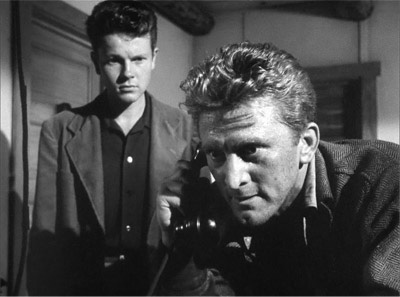
31 Page Booklet (with just the one article)
A Circulation Builder, the article by former Cahiers du Cinema writer Emmanuel Burdeau is the sole content in this latest Blu-ray accompaniment. And it's a cracker. It gives a little context for the making of the film and provides a smart reading of the movie and in turn introducing me to the rather nifty word 'arriviste', (an ambitious, ruthless and self-serving person just in case, like me, it's new to you). Again as in past booklets, some pictures have been printed on their sides. This must be a design choice but it still strikes me as odd. While reading, you're going to stop and turn the booklet around before turning it back to carry on? Or maybe the digital review copy is still in development. No matter. Most of us are capable of turning a small booklet 90 degrees.
Ace in the Hole is an extraordinary, no holds barred, acerbic masterpiece presented here in edible black and white. It's one of Billy Wilder's most accomplished efforts – one of the filmmaker's favourites in fact – and any glance at his varied but classic-filled output will tell you that this speaks volumes. See it if you think Hollywood's a soft touch on cynicism. This movie would never be green lit today (thank God for the past). Hell, see it whatever you think. Heartily recommended.
|